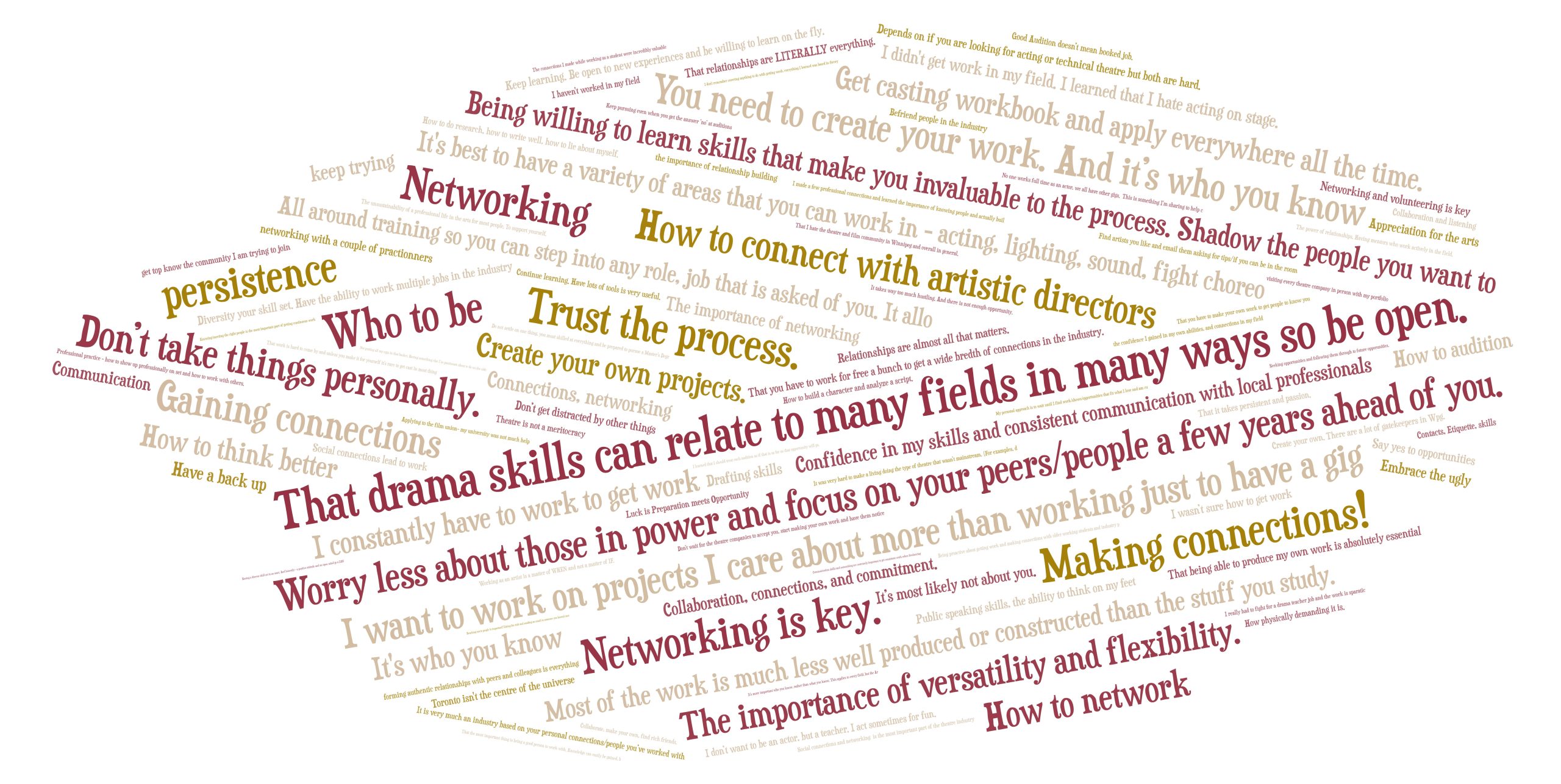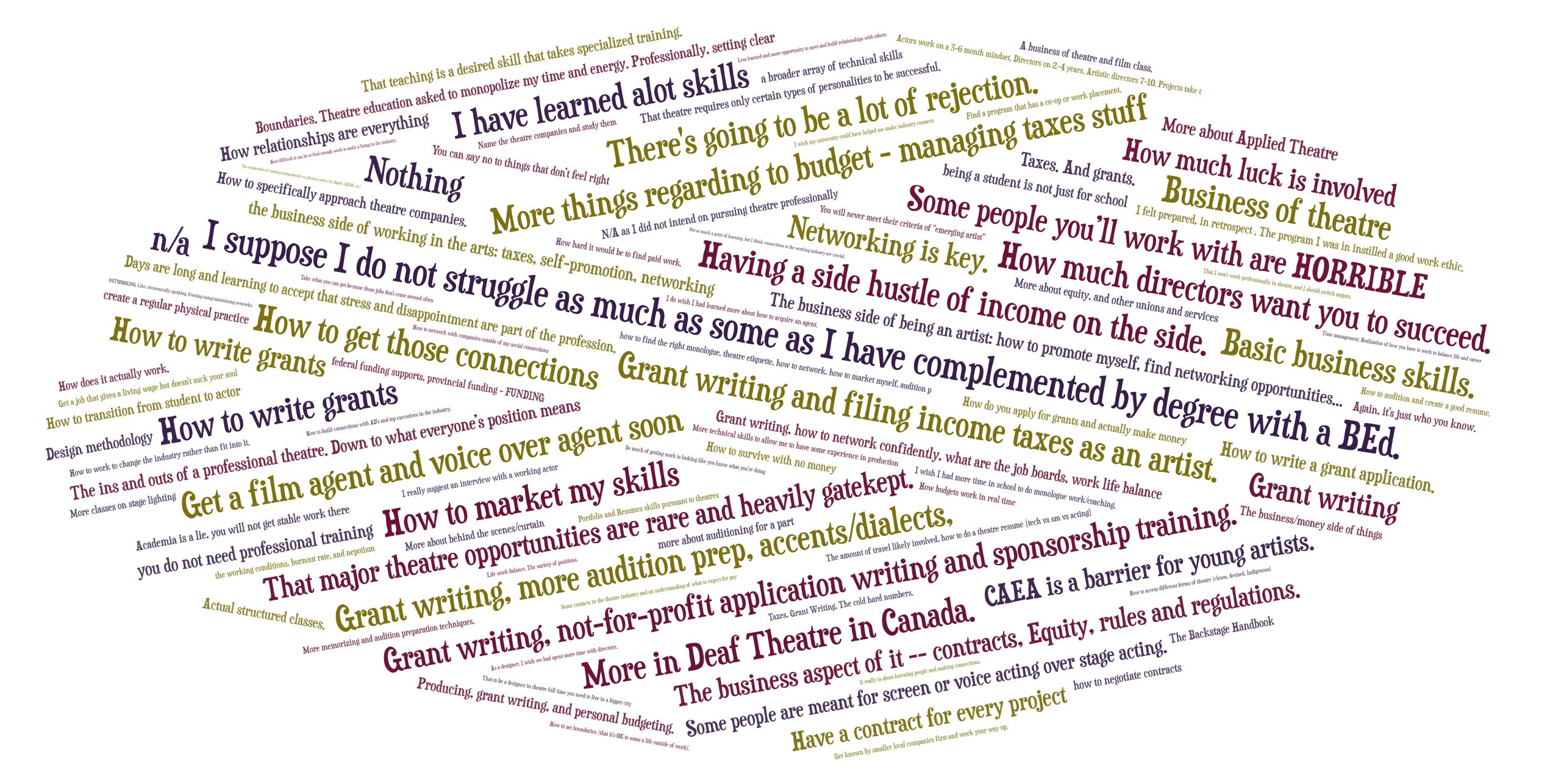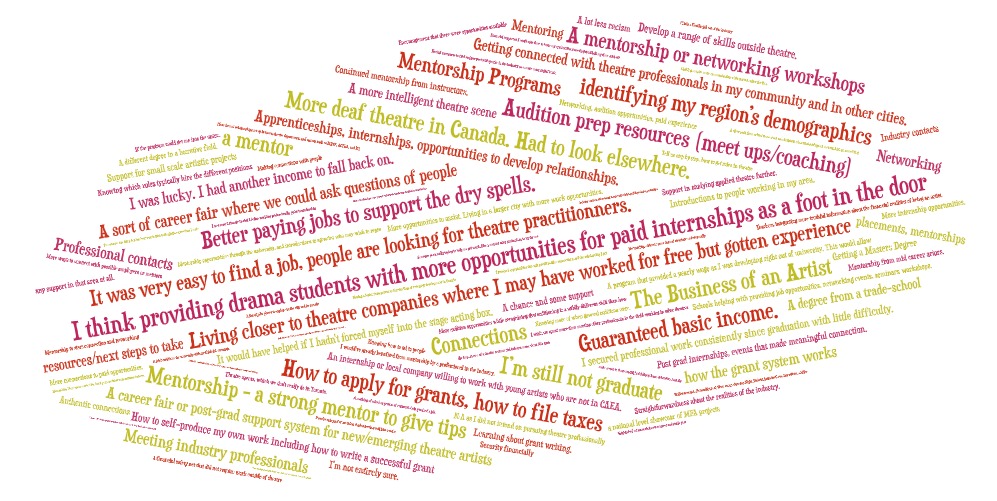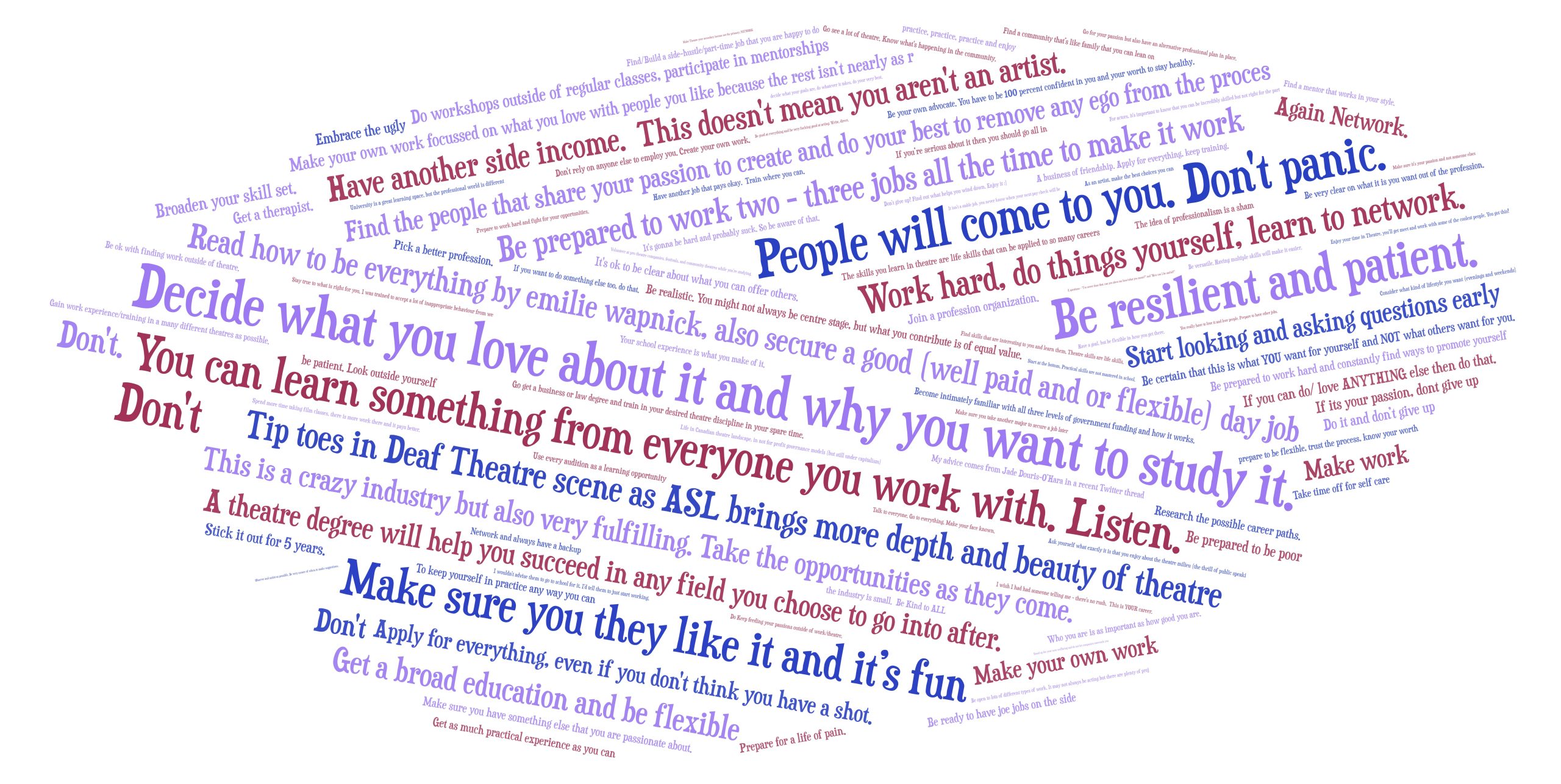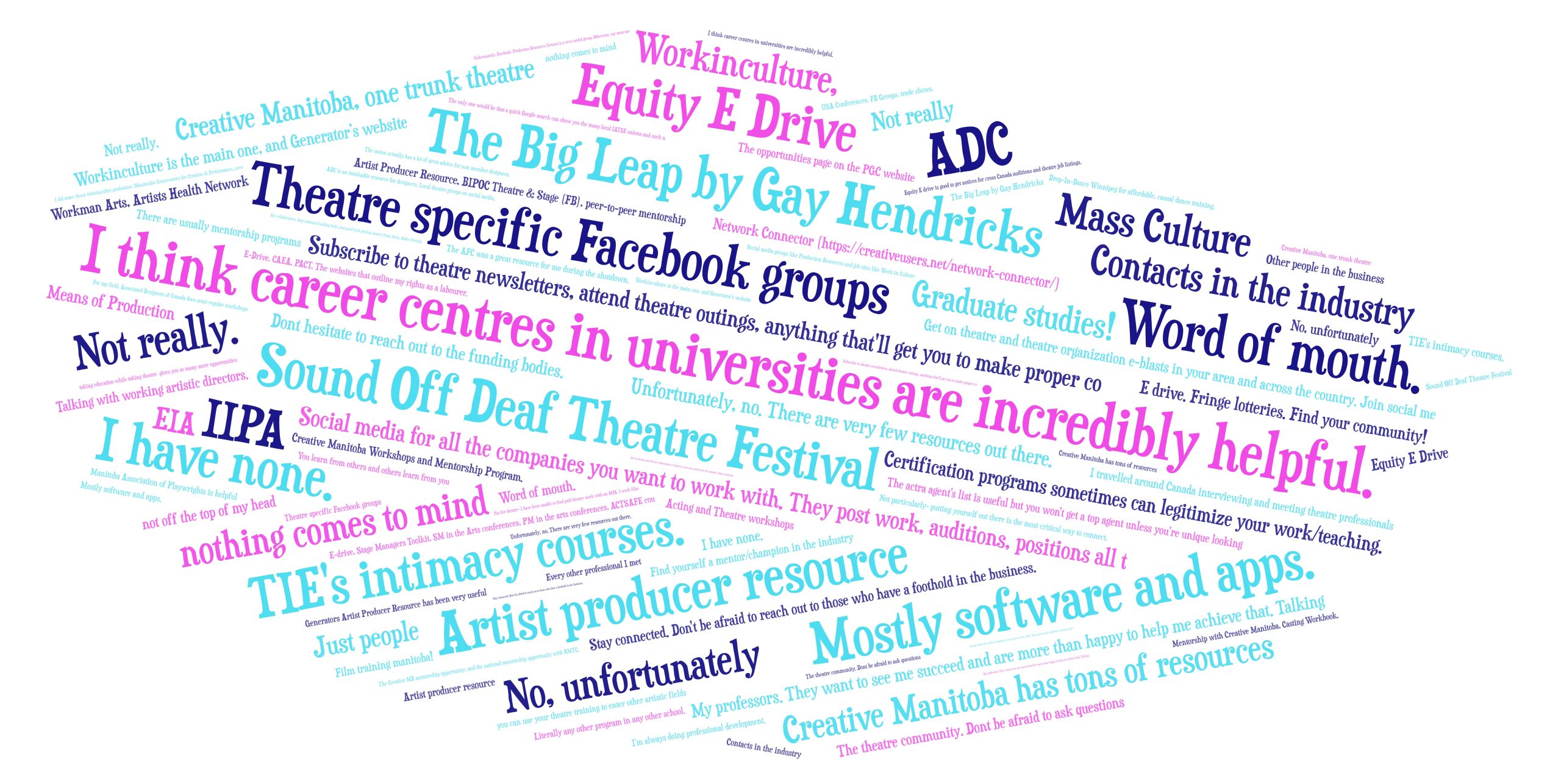National Survey Results
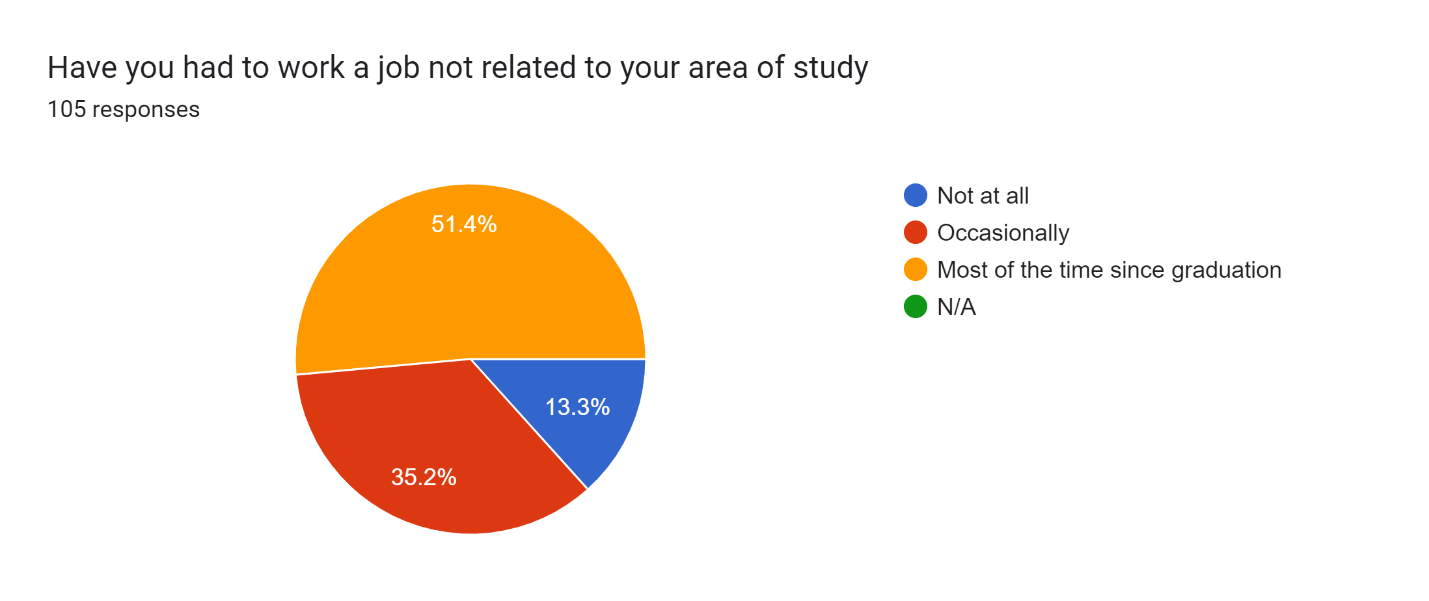
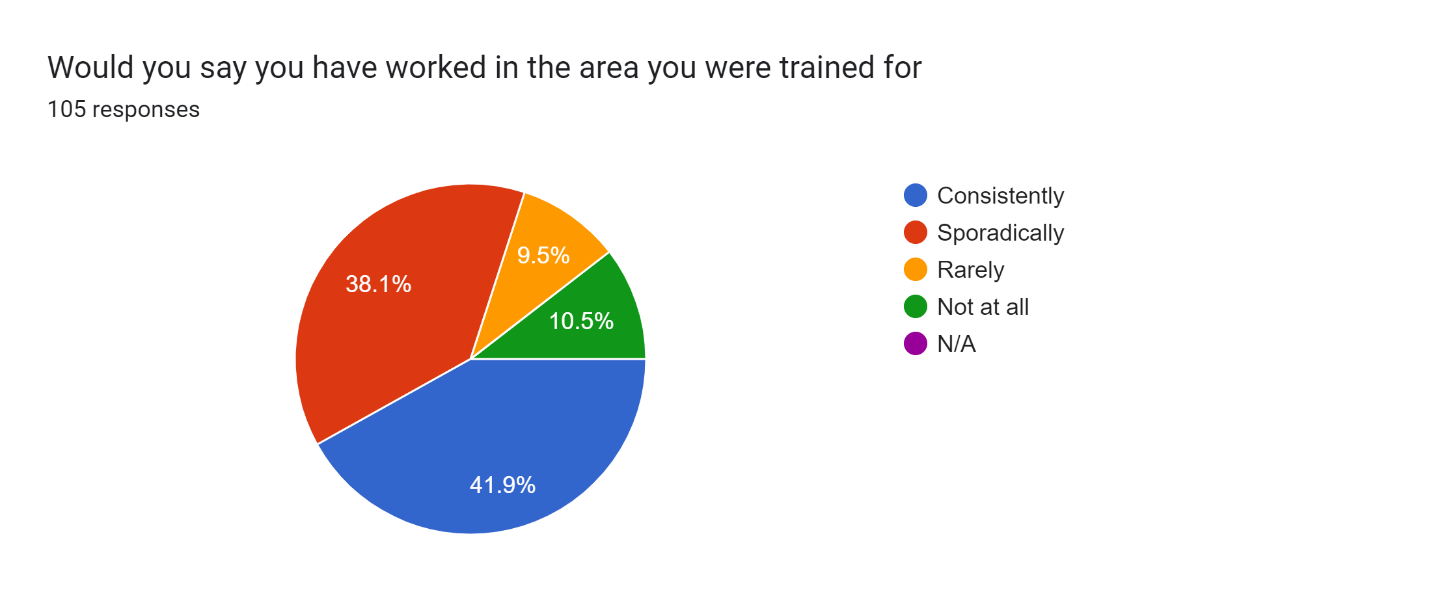

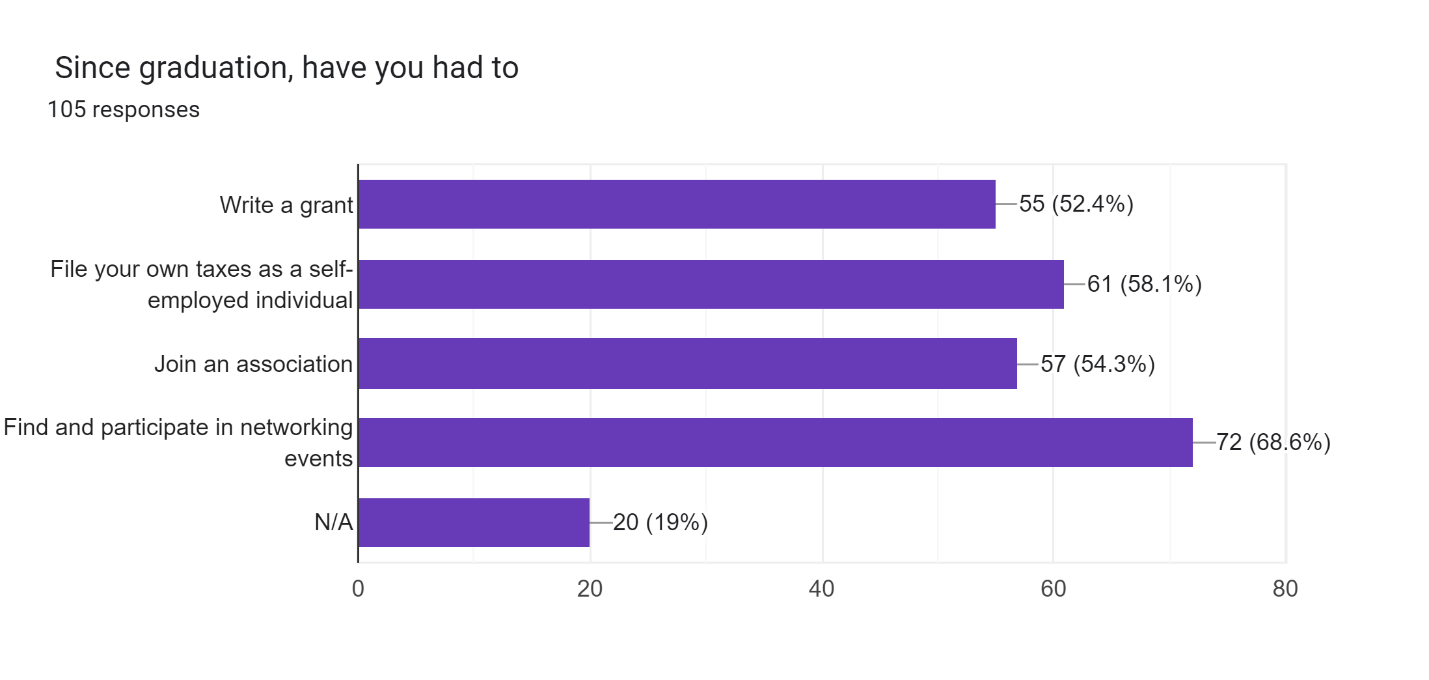
Individual Survey Responses
| # of Answers | |
| Have you | |
| been hired by a theatre company | 25 |
| created your own work | 13 |
| n/a | 17 |
| or a mix of both | 50 |
| Have you had to work a job not related to your area of study | |
| Most of the time since graduation | 54 |
| Not at all | 14 |
| Occasionally | 37 |
| Since graduation, have you had to | |
| File your own taxes as a self-employed individual | 57 |
| Write a grant | 55 |
| Join an association | 57 |
| Find and participate in networking events | 72 |
What was the most valuable thing you learned in regards to getting work in your field after graduation?
| What was the most valuable thing you learned in regards to getting work in your field after graduation? | # of Answers |
| Networking / Making connections in the industry are essential | 35 |
| Persistence & confidence in own work and skills | 10 |
| Create your own work | 7 |
| It’s best to have a variety of areas that you can work in (ie acting, lighting, sound, fight choreography, etc) as opposed to just one practice. You’re more likely to have constant work that way. | 6 |
| Professional practice – how to show up professionally and how to work with others. | 5 |
| Keep learning. Be open to new experiences and be willing to learn on the fly. | 4 |
| No one works full time as an actor, we all have other gigs. This is something I’m sharing to help contextualize your questions, not my answer to this question. There is literally no value in advice. People get jobs by being the right look and being a good actor at the right time. Often, the best actor does not get the part. The most valuable thing is to have a job OUTSIDE of acting so you can afford to live close enough to the action to audition as often as you can. | 4 |
| Communication | 3 |
| Care about the projects you work on, don’t work just “any gig” | 3 |
| Get casting workbook and apply everywhere all the time, the work never ends | 3 |
| Don’t take things personally | 3 |
| Say yes to opportunities | 3 |
| Hard to get in / there is not enough opportunity. | 3 |
| Trust the process. | 2 |
| How to do research, how to write well | 2 |
| The unsustainability of a professional life in the arts for most people. To support yourself financially as a performing artist is challenging, and made even more so by the necessity that most of your time and energy will be put towards “joe jobs” that pay the bills but that are not fulfilling or satisfying. | 2 |
| Volunteer | 2 |
| That drama skills can relate to many fields in many ways so be open | 1 |
| Most of the work is much less well produced or constructed than the stuff you study. | 1 |
| Public speaking skills, the ability to think on my feet | 1 |
| Learn / Know how to self produce | 1 |
| Toronto isn’t the centre of the universe | 1 |
| It was very hard to make a living doing the type of theatre that wasn’t mainstream. | 1 |
| Luck is Preparation meets Opportunity | 1 |
| How to build a character and analyze a script. | 1 |
| Appreciation for the arts | 1 |
| Theatre is not a meritocracy | 1 |
| I learned that I should treat each audition as if that is as far as that opportunity will go. So after I finish auditions, I tell myself I’m done with this project and don’t expect to hear back. Waiting to hear back is draining and it is so very often no. So when I do hear back, it’s a treat, not an expectation. | 1 |
| Keep pursuing even when you get the answer ‘no’ at auditions | 1 |
| Applying to the film union- my university was not much help | 1 |
| Drafting skills | 1 |
| How physically demanding it is. | 1 |
What do you wish you had learned prior to graduation to better prepare you for working professionally in theatre?
| What do you wish you had learned prior to graduation to better prepare you for working professionally in theatre? | # of Answers |
| How to find the work & connect with industry professionals / build relationships & network | 20 |
| Business side of being an artist: (understanding the theatre structure, how to promote myself, find networking opportunities, how to write a grant application, what a budget is and how to balance one, workshopping, creating different resumes and headshots, how to write a contract) | 20 |
| How to write grants | 14 |
| How to choose monologues and prepare for auditions | 10 |
| Having a side hustle of income on the side is essential | 7 |
| How to navigate Rejection & Frustration | 5 |
| Financing & Budgeting | 5 |
| More technical skills to allow me to have some experience in production (be it as a producer, stage manager, or designer). | 5 |
| How to self market | 4 |
| Boundaries. Theatre education asked to monopolize my time and energy. Professionally, setting clear boundaries has totally enhanced my career. | 4 |
| Pro’s & Con’s to Unions and Equity | 4 |
| Filing taxes as an artist | 3 |
| Applying training to selfcare & well being / this is part of being a professional artist | 3 |
| More about design (lighting, design methodology, etc) | 3 |
| Get a film agent and voice over agent soon | 2 |
| Live in a city with access to a lot of different art | 2 |
| How to access different forms of theatre (clown, devised, Indigenous) | 2 |
| More in Deaf Theatre in Canada. Had to create that for myself as deaf Artist as formed Deaf Spirit Theatre Company | 1 |
| How much directors want you to succeed. | 1 |
| That major theatre opportunities are rare and heavily gatekept. | 1 |
| Some people you’ll work with are HORRIBLE | 1 |
| Some people are meant for screen or voice acting over stage acting. | 1 |
| Have contracts for all your work | 1 |
| How much luck is involved | 1 |
| To be successful you need to be able to go out and build relationships | 1 |
| Know your worth, don’t work for free | 1 |
| That teaching is a desired skill that takes specialized training to learn and understand. | 1 |
| You might have to travel for work | 1 |
| Academia is a lie, you will not get stable work there and while it seems like theatre academics are liberal, the exclusionary/racist/etc rhetoric and roadblocks are very present, just hidden below a veneer of liberalism | 1 |
| How to transition from student to actor | 1 |
| Actors work on a 3-6 month mindset. Directors on 2-4 years. Artistic directors 7-10. Projects take time. | 1 |
| How to work to change the industry rather than fit into it. | 1 |
| You can say no to things that don’t feel right | 1 |
| Keep Learning | 1 |
| How hard it would be to find paid work. | 1 |
| Take what you can get because those jobs don’t come around often | 1 |
| Find a program that has a co-op or work placement. | 1 |
| I wish my university could have helped me make industry contacts | 1 |
What would have been most helpful to you after graduation as you attempted to secure work in your area of theatre?
| What would have been most helpful to you after graduation as you attempted to secure work in your area of theatre? | # of Answers |
| Mentorship – a strong mentor to give tips and learn how to be effective in practise. | 20 |
| Getting connected with theatre professionals in my community and in other canadian cities. | 19 |
| Apprenticeships, internships, opportunities to develop relationships. | 18 |
| Knowing the Business of an Artist (including writing grants, file taxes, resume writing and self produce) | 8 |
| Audition prep & resources (meet ups/coaching) | 5 |
| Other paying jobs to support the dry spells outside the theatre scene | 5 |
| A career fair or post-grad support system for new/emerging theatre artists | 5 |
| Educate myself about my region’s demographics and areas for improvement in my specific cultural sector | 3 |
| Support when wanting to study applied theatre further | 3 |
| Financial Support | 3 |
| Understand theatre structures and know who’s hiring | 2 |
| Live where there are many theatre companies | 2 |
| I secured professional work consistently since graduation with little difficulty. | 2 |
| Teachers integrating more truthful information about the (financial) realities of being an artist. | 2 |
| Encouragement that there were opportunities available | 2 |
| Connections to & with Unions | 2 |
| Continue Learning / Studying (MFA) | 2 |
| More deaf theatre in Canada. Had to look elsewhere before had to do it myself | 1 |
| Guaranteed basic income | 1 |
| A program that provided a yearly wage as I was developing right out of university. This would allow recent graduates to take more risks and continue learning without the incredible stress of also needing to support themselves. | 1 |
| A more intelligent theatre scene | 1 |
| A degree from a trade-school | 1 |
| Support for small scale artistic projects | 1 |
| Theatre Agents | 1 |
| Resources of jobs/theatres across Canada | 1 |
| Stay in touch with connections made during studies | 1 |
| if you’re only good at one thing, that’s what they will hire you for. If you’re good at many things, but only like one thing, you’ll have to do all of the other things unless you don’t tell them you’re good at them. | 1 |
| A lot less racism | 1 |
| I think The most helpful thing would have been having more teachers/professors connected and working in the industry. I also think I would have benefitted from more of an alumni network. | 1 |
| Stage Management Development programs, internal to a theatre company (preferably a regional centre). | 1 |
| A job board from the university with available job openings | 1 |
| Less time crunch and expecting everyone to work themselves to the bone for the sake of the industry and because it is what everyone is used to. I think the work culture in Winnipeg theatre expects far too much of production crews and actors when it comes to how much work is put in compared to what you get paid (not to mention how difficult it can be as a freelancer to actually get people to pay you on time). My short experience was that theatre is extremely stressful at every level and something needs to change if we want to allow new people to break into the industry, especially bipoc, lgbtqia+, people with disabilities or mental illness, etc. | 1 |
If you could give any advice to a student preparing to enter the theatre milieu what would it be?
| If you could give any advice to a student preparing to enter the theatre milieu what would it be? | # of Answers |
| Keep learning, participate in workshops & mentorships | 11 |
| Secure a good (well paid and or flexible) day job. This doesn’t mean you aren’t an artist. It means you are thinking about your future and your retirement. | 10 |
| Decide what you love about it and why you want to study it. If its strictly career based, then be flexible. If it is for the passion of it and you’re happy to land where you land, take time to learn outside the niche you may right now think is for you | 7 |
| Be resilient and patient. | 7 |
| Be your own advocate. You have to be 100 percent confident in you and your worth to stay healthy. | 7 |
| You can learn something from everyone you work with. Listen and ask questions | 5 |
| Take opportunities as they come | 5 |
| Find the people that share your passion to create and do your best to remove any ego from the process. | 4 |
| Learn to Network | 4 |
| Don’t hold tight to the plan of “how your life should look by a certain time.” It’s going to look different than you first imagined. | 4 |
| Get a broad education | 4 |
| Have fun | 3 |
| Create your own work. | 3 |
| The skills you learn in theatre are life skills that can be applied to so many careers and opportunities. Don’t shortchange yourself by only focussing on one end goal. | 3 |
| The industry is small. Be Kind to ALL | 3 |
| Working in arts administration isn’t the field of theatre I wanted to go into, but it has opened so many doors and has let me make so many connections. | 2 |
| Make sure you have something else that you are passionate about and don’t define yourself or your happiness based off of theatre work. | 2 |
| Ask yourself what exactly it is that you enjoy about the theatre milieu (the thrill of public speaking?; the challenge of working collaboration creative projects?; the flexibility of a non-traditional work environment?) and consider if there are other fields and industries that can satisfy this desire. It is likely that another industry can both satisfy the artist in you, and provide you greater financial security and benefits that make it possible to live a more comfortable lifestyle. | 2 |
| Tip toes in Deaf Theatre scene as ASL brings more depth and beauty of theatre | 1 |
| A theatre degree will help you succeed in any field you choose to go into after. The skill of making connections with other humans and the ability to speak in front of them in a dynamic and intriguing way is invaluable in many professions. I recommend a theatre class at the very least to everyone. | 1 |
| If you can do/ love ANYTHING else then do that. | 1 |
| Learn about the Business side of theatre, especially grant writing | 1 |
| Research the possible career paths. | 1 |
| Your school experience is what you make of it. | 1 |
| Go see a lot of theatre. Know what’s happening in the community. See work you think you won’t like, not just what you like. Don’t be afraid to reach out to people you’re interested in working with or learning from by email or phone – what’s the worst that will happen? Sign up for newsletters, a lot of them; this will get you the information you need without having to scroll through social media endlessly. | 1 |
| Stick it out for 5 years. If you feel like you’ve gotten no where after that, you have permission to quit. | 1 |
| Spend more time taking film classes, there is more work there and it pays better. | 1 |
| The idea of professionalism is a sham; presenting and working as your authentic self is more rewarding and fulfilling. You will also find your people; do not pressure yourself to “network.” | 1 |
| If you want to succeed learn about society and politics and current issues, be on the for front. Theatre is ahead of the times of everyone else, but everyone in theatre is behind where we need to be. | 1 |
| Find a community that’s like family that you can lean on emotionally and even financially. | 1 |
| I wouldn’t advise them to go to school for it, I’d tell them to just start working in the industry in any job they can find and pick people’s brains. | 1 |
| Be versatile | 1 |
| Be willing to volunteer | 1 |
| As an artist, make the best choices you can – often there’s no one right answer! And you may pick a choice that isn’t the “best” but being ambivalent helps nobody in the process. Be confident and don’t sell yourself short – your perspective deserves to be shared! – but balance that with awareness of what you DON’T know and think of questions to ask to help with that (eg, “I’m a set designer whose school didn’t have a fly house. Here’s what we’re hoping to do with flying elements, what do I need to account for in my design to make that happen?” That question could be posed to the TD of the theatre that hires you, and/or reach out to a mentor to get some background.)! People are almost always willing to help and happy to share their experience and expertise if you can be clear about the help you need to make the show successful. Nobody expects you to know everything! Part of collaboration is being open, and a sense of give-and-take with everyone in the process. | 1 |
| Be good at everything and be very fucking good at acting. Write, direct. See yourself working as a producer. Ultimately treat every week like a 40 hour work week, even though it’s not fair because most of that time you’ll never be paid for. Move, travel, so you can lear, thrive. Knowing you can always go home. And most importantly find your voice. Give answers not questions. Bully your way in. | 1 |
| My advice comes from Jade Douris-O’Hara in a recent Twitter thread: that if you want to have a lifelong career in theater, it is absolutely essential, but you also have a well paying skilled trade you can use to fill in for long periods of time when you will not be working in the theater. | 1 |
| Get a therapist. This isn’t my advice but a piece I got from Lisa Li that I love to share given in the context of submitting for funding: “You are going to get so many no’s in your life, you will never be in short supply. Never tell yourself no, always apply and force THEM to tell you no”. | 1 |
| I wish I had had someone telling me – there’s no rush. This is YOUR career. Make it so specifically yours. Have the courage to live the life that you would love. Not some imposed idea of success, but YOUR unique ideas. Start small. Create a daily routine and practice – even very small, a few minutes a day, finding how you like to warm up, move, sing, vocalize, audition, create characters, etc. Get curious and start experimenting with how you like to be in the room – find one or two theatre artists you trust and start playing together. Let this inform how you audition and train and articulate for yourself what kind of work you want to do and what kinds of artists you want to work with and what things make you come alive. Graduating is just the beginning of DISCOVERY. Dare to not know yet all that you want to be and create. You’re pumped full of training, now play around with all that material and see where it all lands in you. What are your favourite exercises that you go back to again and again? Keep those! Make them routine! Let them be your foundation. What else? Which teachers’ approach inspired you? Copy them! Which text do you fall back on? Memorize it and let it live in your mouth and your body! Find more like it! Find others who like similar things or different things in similar ways. Explore explore explore and “success” will find you. Have fun and get curious! | 1 |
Have you found any useful resources since graduation that you want to share?
| Have you found any useful resources since graduation that you want to share? | # of Answers |
| Industry Contacts across Canada | 9 |
| Creative Manitoba & Creative MB Mentorship Program | 5 |
| Arts Organizations such as Playwrights Guild of Canada, Tarragon Theatre, CATR, CanDrama, Playwrights Workshop Montreal, and Playwrights Atlantic Resource Centre, MB Association of Playwrights; Mass Culture; Got Your Back Canada; Association of Acting Coaches and Educators (AACE), Howlround article on acting training in Canada; Tangled Arts + Disability; Beyond the Professoriate; Roostervane | 5 |
| Social Media | 4 |
| Equity E Drive | 4 |
| ADC for Designers | 4 |
| Graduate Studies & Continuing Education | 3 |
| Professors & Instructors | 2 |
| IATSE | 2 |
| Theatre Outings | 2 |
| Workinculture | 2 |
| Arts Councils such as: WAC, MAC, CCA | 2 |
| Career centres in universities | 1 |
| Software and apps | 1 |
| Artist producer resource | 1 |
| Sound Off Deaf Theatre Festival | 1 |
| The Big Leap by Gay Hendricks | 1 |
| TIE’s intimacy courses. | 1 |
| Theatre Newsletters | 1 |
| One Trunk Theatre | 1 |
| Theatre E-Blasts | 1 |
| Network Connector (https://creativeusers.net/network-connector/) | 1 |
| Generators Artist Producer Resource | 1 |
| Stage Managers Toolkit, SM in the Arts conferences, PM in the arts conferences, ACTSAFE courses, apprentice advisor list on CAEA | 1 |
| National Mentorship Opportunity with RMTC | 1 |
| Workman Arts, Artists Health Network | 1 |
| IIPA | 1 |
| Fringe Lotteries | 1 |
| Mentorship Programs offered by Provincial Arts Programs, Universities and Theatres | 1 |
| Acting and Theatre workshops | 1 |
| Drop-In-Dance Winnipeg for affordable, casual dance training. | 1 |
| Means of Production | 1 |
| Film training manitoba | 1 |
| EIA | 1 |
| Read how to be everything by Emilie Wapnick | 1 |
